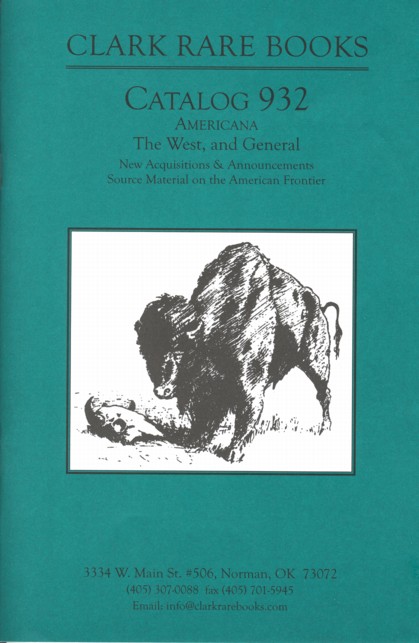Rare Book Monthly
Book Catalogue Reviews - March - 2008 Issue
Americana and the American West from Clark Rare Books
By Michael Stillman
Now available from Clark Rare Books is their Catalog 932 of Americana, The West, and General. Offered is a mix of primarily western antiquarian books, recent works about the past, and more recent reprints of older works. In other words, this is a catalogue for both collectors and scholars, as well as those looking for some interesting books to read. Clark offers over 250 (actually 251) books and pamphlets on America (including Canada), such as these.
William Tecumseh Sherman is not generally remembered for his skills as a banker. Just as well. He wasn't very good at it. If he were, he might have been able to subdue the South by handing out subprime loans to southern homeowners. Dwight Clarke recounts Sherman's pre-Civil War banking career in William Tecumseh Sherman: Gold Rush Banker, published in 1969. It tells of Sherman's career in San Francisco and his impressions of that city during the Gold Rush. Ultimately, Sherman's bank failed and he was forced to move on to another career. Item 31. Priced at $32.50.
For more information about his other career, item 48 is a third edition of the Personal Memoirs of General W.T. Sherman, published in 1890 (during his lifetime). His California exploits are covered in volume one, while his better-known military career during the Civil War is covered in volume two. $75.
If Sherman as a banker seems odd, how about John C. Calhoun as an American nationalist? Item 109 is his 1820 Report of the committee on...fitting out and prosecuting the expedition to the Yellow Stone River... Calhoun, who a decade later would support states' rights to nullify federal laws and to secede from the Union, at this time supported the Missouri Compromise and westward expansion of the united nation. $195.
Nearing the end of his life, Calhoun would oppose the Compromise of 1850, which attempted to preserve the Union, because it limited the extension of slavery to the new territories. Another long-time senator from a slave state, Thomas Hart Benton of Missouri, would also oppose that compromise, but on very different grounds. Benton had come to oppose slavery, not a popular position with his constituents, and one that would get him defeated a few years later. Benton earned a place in John F. Kennedy's "Profiles in Courage" as a result of his stand. Item 240 is Mr. Benton's Anti-Compromise Speech, published in 1850. $85.
The growing divide over slavery, plus American success in the Mexican War, led to a period of filibustering in the 1850s. Private Americans sought to militarily take over nations to the south. The hope was this would appeal to expansionists, while the opportunity to establish slavery in these lands would interest southerners. One such expedition was that of Colonel Henry Crabb, a California state legislator. His hope was to take over the Mexican state of Sonora, and he figured his connections to the powerful family of his Mexican wife would help. In 1857, with a group of fewer than 100 followers (reinforcements he expected were never sent), he entered Mexico near Tucson and headed south for Caborca. He reached that town on April 1, believing many Mexicans would join him. He was sadly deluded. After holding out for six days, he surrendered, but instead of being returned to the States, as he expected, Crabb and all but one of his followers were executed. Crabb's head was removed and placed in a bottle of alcohol for display. Item 234 is the official report, Execution of Colonel Crabb and Associates. Message from the President of the United States... published in 1858. $125.









